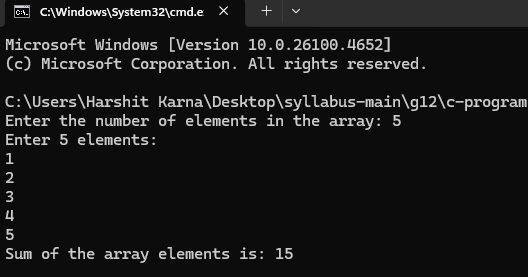Chapter 2: C-Programming
Introduction
1. Working with a Function
a. Define Function
A function is a block of code that performs a specific task. In C, functions help modularize programs and make code reusable and easier to maintain.
b. Syntax of Functions
return_type function_name(parameters)
{
// body of the function
}
c. Types of Functions
- Library Functions: Predefined functions provided by C libraries (e.g., printf(), scanf()).
- User Defined Functions: Functions created by the programmer to perform custom tasks.
d. Components of Function
- Function Prototype: Declaration of a function before its use.
- Function Call: Statement that invokes the function.
- Function Definition: Body of the function where actual statements are written.
- Return Type: Data type of value returned by the function.
2. Categories of Function with Examples
i. Function with Return Type but No Arguments
int getNumber()
{
return 10;
}
ii. Function with Return Type with Arguments
int add(int a, int b)
{
return a + b;
}
iii. Function with No Return Type and No Arguments
void display()
{
printf("Hello World");
}
iv. Function with No Return Type but with Arguments
void printNumber(int n)
{
printf("Number is %d", n);
}
3. Storage Classes
-
Automatic: Default storage class for local variables.
void demo() { int x = 10; // automatic by default printf("%d", x); } -
External: Variables declared outside all functions and accessible globally.
#include <stdio.h> int globalVar = 5; // external void show() { printf("%d", globalVar); } -
Register: Variables stored in CPU registers for faster access.
void fastAccess() { register int i; for(i = 0; i < 10; i++) printf("%d ", i); } -
Static: Variables that retain their value between function calls.
void counter() { static int count = 0; count++; printf("Count = %d\n", count); }
4. Recursive Function with Syntax and Example
A recursive function calls itself to solve smaller subproblems.
Syntax:
return_type function_name(parameters)
{
if(condition)
return result;
else
return function_name(updated_parameters);
}
Example 1: Factorial
#include <stdio.h>
int fact(int);
int main()
{
int n;
printf("Enter a number: ");
scanf("%d", &n);
printf("Factorial of %d is %d\n", n, fact(n));
return 0;
}
int fact(int n)
{
if(n == 0 || n == 1)
return 1;
else
return n * fact(n - 1);
}
Output:

Example 2: Sum of natural numbers
#include <stdio.h>
int sum(int);
int main()
{
int n;
printf("Enter a number: ");
scanf("%d", &n);
printf("Sum of first %d natural numbers is %d\n", n, sum(n));
return 0;
}
int sum(int n)
{
if(n == 0)
return 0;
else
return n + sum(n - 1);
}
Output:

5. Passing Array to a Function
Example: Sum of Array Elements
#include <stdio.h>
void addarray(int[], int);
int main()
{
int n;
printf("Enter the number of elements in the array: ");
scanf("%d", &n);
int arr[n];
printf("Enter %d elements:\n", n);
for(int i = 0; i < n; i++)
{
scanf("%d", &arr[i]);
}
addarray(arr, n);
return 0;
}
void addarray(int arr[], int size)
{
int sum = 0;
for(int i = 0; i < size; i++)
{
sum += arr[i];
}
printf("Sum of the array elements is: %d\n", sum);
}
Output:
